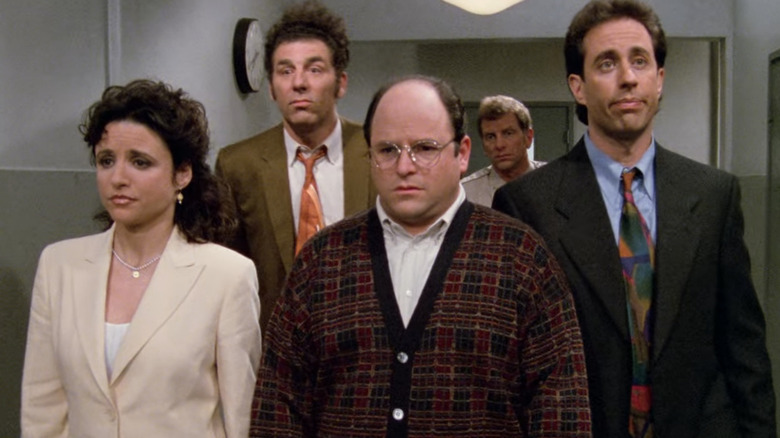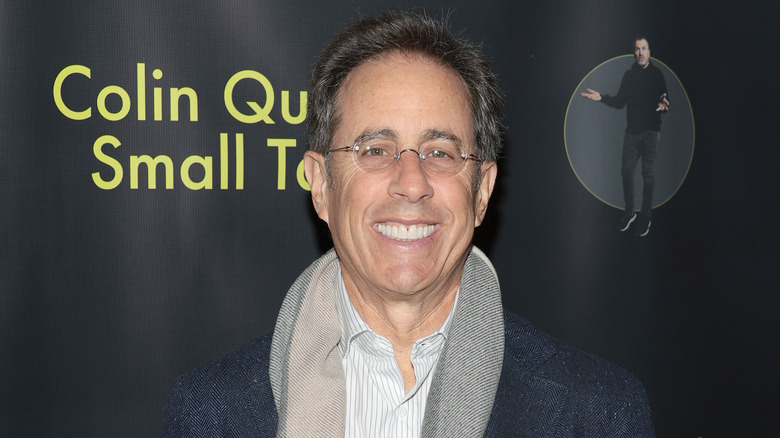Jerry Seinfeld's Theory As To Why Seinfeld's Finale Caught A Bad Rap With Fans
"Seinfeld" is often hailed as the greatest sitcom of all time, as the hit show from Larry David and Jerry Seinfeld remains in high demand decades after its initial run on NBC. But after nine seasons of hilarity, many fans believe the show stepped on a rake in its final episode.
The series finale was a two-parter in which the main characters finally sell the sitcom they've been pitching to networks for some time. But en route to Los Angeles, they get waylaid in a small Massachusetts town by plane trouble. There, they witness a carjacking, but instead of intervening to help, they film the crime while cracking cruel jokes about the victim's weight. Arrested under a local law requiring bystanders to help people in danger, the foursome is ultimately sent to prison.
In many ways, the finale makes explicit the underlying cruelty at the center of "Seinfeld." The characters agree while in jail that they could have called for help and still enjoyed watching the carjacking victim suffer on tape after the fact. Indeed, misanthropy was always the point. As media critic Chuck Klosterman wrote in his book, "I Wear the Black Hat," "Seinfeld" is a satire of the most villainous aspects of American society (via BuzzFeed). "It was satire so severe," he writes, "that we pretend it wasn't satire at all." Well, with the finale, there was no way of pretending. Removed from their native habitat of New York City, the group's antics are laid bare in their reprehensibility, and perhaps that was a step too far for many viewers who despised the episode.
For his part, Jerry Seinfeld once had a theory regarding why the "Seinfeld" finale didn't work for fans, one that also revolves around its scale.
Seinfeld thinks the Seinfeld finale went too big
In a roundtable for the nine-year anniversary of the "Seinfeld" Season 9 finale, the cast of the show got together with showrunner Larry David to dissect it postmortem. At one point, their discussion turned to the notably poor reception of the series finale, where Jerry Seinfeld had some thoughts regarding the reason audiences didn't respond to it. He theorized that the show had always been at its most potent when it focused on small-scale events and that the much grander ambitions of the finale had felt out of step with that ethos. "I think one of the things that people had a problem with is that it didn't feel like the show," Seinfeld said, "because it wasn't small. It was big, and we didn't really do big. Small was really our instrument that we played. And that might have been why the people that were so used to the show and liked it so much felt a little, 'This doesn't fit in.'" However, Seinfeld defended the larger scale of the two-part episode, saying, "But it was the finale. It had to — it should've been different."
But Seinfeld is probably right that the finale's abandonment of the mundanity that fed the show's best moments caused it to sour in the mouths of fans. Elsewhere in his essay on "Seinfeld," Klosterman wote that the show was a reflection of the everyday cruelty of American culture. "On 'Seinfeld,' the psychopathy felt normal—almost boring," Seinfeld noted.
Without the minutiae of ordinary life to make them relatable, Jerry and his nihilistic compadres feel unmoored. Indeed, Seinfeld's observations are probably correct. These characters, with their knives out for the world around them, were made tolerable by their smallness. Make them big, and all that's left are the blades.

